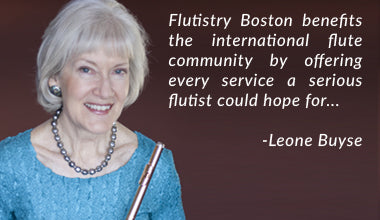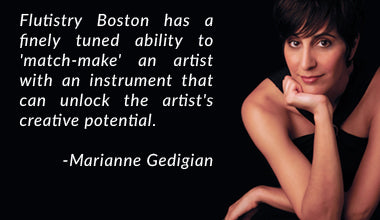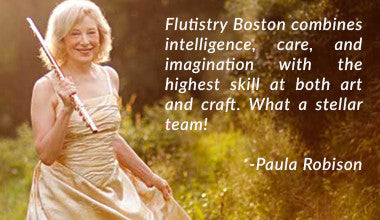
BAROQUE FLUTISTRY
Longtime friend and award-winning baroque and modern flutist Sarah Paysnick and I were on the same flight home from the 2013 National Flute Association Convention in New Orleans, LA. During the flight, we started talking about what sort of projects she was doing and where her interests were leading her. I was excited when she told me that she enjoys working with modern flutists to help enhance their understanding and application of Baroque style. It was perfect timing because Flutistry Boston was just beginning the process of identifying “specialists” for potential collaboration. And so Baroque Flutistry was born as one of our inaugural creative projects. Whether it’s a single coaching, lessons on Baroque flute, or a masterclass setting, Baroque Flutistry is the resource for modern flutists who want to be historically informed performers.
Playing baroque flute...
- is one very important tool that will help enrich your understanding and interpretation of some of the greatest pieces written for the flute.
- involves learning many different tonguing syllables and articulations, which can be combined in endless ways to help express the character of a line in a direct, speech-like way.
- will give you a better understanding of trills and other ornaments and increase confidence incorporating them into your playing.
- will introduce your ear and imagination to new tone colors.
- will teach you to play with a warmer, richer sound than you ever imagined – without needing any vibrato.
- will expand your perception of dynamics, and encourage you to project your musical intentions loudly even when playing pianissimo.
- will inspire you to develop a very sophisticated, thoughtful vibrato, and will show you how using varying amounts, speeds, and widths of vibrato can help shape a phrase beautifully.
- will help you understand why different keys are associated with different characters.
- along with playing other historical flutes, will give you an intimate knowledge of the history of the instrument and its repertoire.
- increases your value as a modern flutist as more and more people are interested in historically informed performance (HIP).
Quotes
from string players exploring gut strings and baroque bows (New York Times)
"It opens up for me a whole spectrum of color and possibilities.” - Matt Haimovitz
“With the strings already being so resonant, vibrato felt, to paraphrase something George Szell once said, like pouring chocolate sauce on asparagus,”
Mr. Brey said. “The bow really is the engine of expression.” The gut strings, [Brey] said, "forced me to ditch my old habit of dragging and forcing the sound out and instead use little bow strokes to liberate it.”
About Sarah Paysnick

A native of Massachusetts, flutist Sarah Paysnick is praised for “[producing] a beautifully tuned (and vibrato free) liquid tone.” (Tom Moore, Early Music America). She performs regularly in the Greater Boston area with many period ensembles including L’Académie, Arcadia Players, Exsultemus, Cambridge Concentus and Harvard Baroque, where she frequently appears as concerto soloist. After winning the National Flute Association’s Baroque Artist competition in August of 2009, she moved to Israel for a year, where she performed with Israel's leading historical performance ensembles: Barrocade, the Jerusalem Baroque Orchestra, and Ensemble Phoenix. Upon returning to Boston she co-founded Musical Offering, a period chamber ensemble that explores music linking the high Baroque and Classical styles. In 2012 she co-founded Grand Harmonie, an ensemble of varying size bringing period instrument performances of Classical and Romantic repertoire to the East Coast.
As an award-winning modern flutist, Sarah earned a BM at Ithaca College studying with Wendy Mehne, and a MM from the University of Texas at Austin studying with Marianne Gedigian. She also spent a year studying with Jill Felber in Santa Barbara. While studying with Ms. Gedigian, she won the Pappoutsakis Memorial Flute Competition in 2004. After Austin, Sarah returned to Boston and began focusing on Baroque repertoire, though she teaches lessons on both modern and historical flutes.
Sarah was appointed Coordinator of Baroque Masterclasses & Competitions for the National Flute Association (NFA) in October of 2012 and will serve a five-year term. She was also elected to the board of the Cambridge Society for Early Music (CSEM) and has served on the board of the Pappoutsakis Memorial Flute Competition since 2007.
Find out more about Sarah at www.sarahpaysnick.com
About Andrea LeBlanc
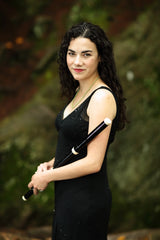
Andrea LeBlanc is devoted to furthering the artistry and expression of the flute by performing on instruments original to or reproductions from the baroque, classical, and romantic eras.
Her regular engagements in Boston include the Handel and Haydn Society, Boston Baroque, Grand Harmonie, and Cambridge Concentus. Ms. LeBlanc has also appeared with the Folger Consort in Washington, D.C. and in 2009 performed Bach’s St. Matthew Passion on Cambridge Concentus’ tour of Japan, under the direction of Joshua Rifkin. She is the principal flutist of Arcadia Players and L’Academie, and performs chamber music of the late-classical and early-romantic periods with pianist David Hyun-Su Kim. She has worked with such conductors as Masaaki Suzuki, Harry Christophers, Joshua Rifkin, Ian Watson, and Simon Carrington. In 2012, Ms. LeBlanc became the first baroque artist to participate in Music at Eden’s Edge Emerging Artist program, and was invited to become a full member based on her exemplary participation. She has also performed at the Blue Hill Bach Festival in Maine, and has been an audience favorite at the Big Moose Bach Festival in Gorham, NH since its inception in 2010. Ms. LeBlanc holds a B.Mus. with honors and distinction in performance from New England Conservatory and a M.Mus. from the University of Massachusetts Amherst, where she was a teaching assistant in flute and early music. She spent a year furthering her study of the traverso at the Royal Conservatory in The Hague (Netherlands). She has studied with Christopher Krueger and Kate Clark.Find out more about Andrea at www.andrealeblanc.com
